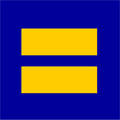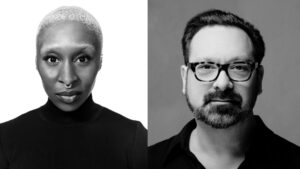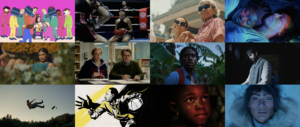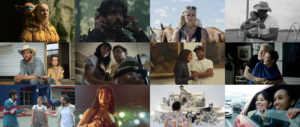Festival Director John Cooper accepts the Equality Award.
Sundance Institute
On June 8, Sundance Film Festival Director John Cooper accepted the Human Rights Campaign Equality Award on behalf of Sundance Institute. Below are his remarks from the awards ceremony held in Salt Lake City, Utah.
“Thank you. It is my pleasure to be here tonight to celebrate equal rights. And I am honored to accept the Equality Award on behalf of Sundance Institute.
Thank you to Chad Griffin for your leadership at HRC and to the incredible volunteers who worked so hard to put this event together.
Since we call Utah “home,” many of you know what we do. But for those of you who are not as familiar: Sundance Institute is a year-round nonprofit organization that discovers and supports independent film and theatre artists from the U.S. and around the world, and introduces audiences to their new work. Our programs include the Sundance Film Festival as well as creative and financial support for directors, screenwriters, playwrights and composers.
Robert Redford founded Sundance Institute in 1981 on the simple – but actually pretty radical – belief that storytellers have the ability to broaden our minds, engage, provoke, inspire and ultimately connect us. Like the independent artists we support, we are dedicated to taking risks and serving as a platform for issues no matter how challenging or different they may be.
We are now known as a leader in discovering LGBT cinema, and the funny thing is that we never consciously set out to make that impact on the world. For more than 30 years, we’ve simply supported stories that need to be told. We look for strength of vision, innovation in technique and the weight of the story or issue.
One of the first the very openly gay films we showed at our Festival was Longtime Companion, in 1990. It was different and frankly, it was very gay. We didn’t even know if we could show it in Utah. I remember talking to Redford about the film and I found myself speaking almost apologetically about it. He gave me the famous look he gives when he needs to drive a point home and said, “Show it. That’s what we do.” So we did. And yes, some people were upset with us. But people who were open to the film really felt its power. The film won that year’s audience award.
From that point on, there was no turning back. During the cocktail hour tonight you saw photos from some of the more iconic LGBT films we’ve helped launch over the years. To name just a few:
Orlando
Mysterious Skin
Becoming Chaz
Pariah
Circumstance
We Were Here
The Kids Are Alright
We programmed films like Kinky Boots, Four Weddings and a Funeral and Laramie Project on opening night – the most visible part of the Festival.
And at every point along the way, audiences at our Festival have been welcoming and accepting of these LGBT stories. Way back in 1991, we screened Vegas in Space starring Doris Fish, one of the most noted drag queens in San Francisco. We were afraid no one would show up but we were pleasantly surprised to find a sea of drag queens crowding the lobby of the Egyptian for its premiere. That included a huge group of friends who drove four and a half hours from St. George, Utah to see the film.
Many of the LGBT films we’ve shown came at critical moments in time, when it was important to highlight the AIDS crisis and expose LGBT discrimination. These stories went on to break down barriers and change a nation’s point of view.
I’ve seen that firsthand. Twenty years ago, when my partner and I decided to have kids with a lesbian couple, people told me, “Two gays and two lesbians? That’s fine for you but what about the kids?” Their questions made me pause and wonder, “Am I doing the right thing?” Last weekend, we attended my oldest daughters’ high school graduation, and I am happy to report that our children are very happy, healthy and well-adjusted. We have the same struggles any parent has but at the end of the day our family is loving, supporting and normal. And I love that that is more understood and accepted today than it was 20 years ago. There’s no doubt in my mind that increased visibility for LGBT people is to credit for that. Gay and lesbian characters are now seen in many mainstream television drama series, and The Kids Are All Right (which premiered at our Festival in 2010) was nominated for four Oscars.
Looking to the future, gay cinema is changing. Artists will lead us into the next generation of LGBT stories. And Sundance Institute will continue to support and showcase their work. We will continue to be bold with our decision-making. We will continue to serve as a platform for stories that unite us and impact our lives in new ways.
This is truly an honor. Thank you to the Human Rights Campaign.”




